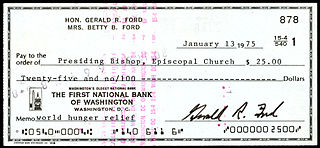Washington Mutual, Inc. was an American savings bank holding company based in Seattle. It was the parent company of WaMu Bank, which was the largest savings and loan association in the United States until its collapse in 2008.

NZ Post, shortened from New Zealand Post, is a state-owned enterprise responsible for providing postal service in New Zealand.

Airdrie Savings Bank was a small commercial bank operation in the Lanarkshire area of Scotland. It ran three branches throughout the area, with its head office in Airdrie at the time of the announcement of its closure. Total assets of the bank at 31 October 2013 were £158 million with a reported loss of £267,000. In January 2017, the bank announced it would begin closure proceedings on 28 April of that year.

A transaction account, also called a checking account, chequing account, current account, demand deposit account, or share draft account at credit unions, is a deposit account or bank account held at a bank or other financial institution. It is available to the account owner "on demand" and is available for frequent and immediate access by the account owner or to others as the account owner may direct. Access may be in a variety of ways, such as cash withdrawals, use of debit cards, cheques and electronic transfer. In economic terms, the funds held in a transaction account are regarded as liquid funds. In accounting terms, they are considered as cash.

Kiwibank Limited is a New Zealand state-owned bank and financial services provider. As of 2023, they are the fifth-largest bank in New Zealand by assets, and the largest New Zealand-owned bank, with a market share of approximately 9%.

The term national bank generally refers to a bank that operates across and within a nation state or country, but its usage varies by country. In some cases it operates as the government's reserve bank, while in others the name is used for commercial banks.

ANZ Bank New Zealand Limited is a New Zealand banking and financial services company, which operates as a subsidiary of Australia and New Zealand Banking Group Limited of Australia. ANZ is one of New Zealand's big four banks, and is the largest bank in New Zealand with approximately 30% of market share as of March 2021.

The Australia and New Zealand Banking Group Limited (ANZ) is a multinational banking and financial services company headquartered in Melbourne, Victoria, Australia. It is Australia's second-largest bank by assets and fourth-largest bank by market capitalisation.

Postal savings systems provide depositors who do not have access to banks a safe and convenient method to save money. Many nations have operated banking systems involving post offices to promote saving money among the poor.
The New Zealand Post Office (NZPO) was a government department of New Zealand until 1987. It was previously named the New Zealand Post and Telegraph Department.

A cheque or check is a document that orders a bank to pay a specific amount of money from a person's account to the person in whose name the cheque has been issued. The person writing the cheque, known as the drawer, has a transaction banking account where the money is held. The drawer writes various details including the monetary amount, date, and a payee on the cheque, and signs it, ordering their bank, known as the drawee, to pay the amount of money stated to the payee.
H.F. Ahmanson & Co. was a California holding company named after Howard F. Ahmanson Sr. It was best known as the parent of Home Savings of America, once one of the largest savings and loan associations in the United States.
Databank Systems Limited was the name of a not-for-profit "off balance sheet" company set up by a consortium of competing banks in New Zealand, to operate on what is nowadays termed a "Shared services Agency" basis, to provide computing resources for the consortium members. The company was set up in 1967, and in 12 years grew to be the largest non-Government data processing organisation in the Southern Hemisphere, servicing more than 1,200 banking offices.

A bank is a financial institution that accepts deposits from the public and creates a demand deposit while simultaneously making loans. Lending activities can be directly performed by the bank or indirectly through capital markets.

POLi Payments Pty Ltd is an online payments company based in Melbourne, Australia. It is the developer and provider of POLi, an online payment system that is used by merchants and customers in Australia and New Zealand. POLi Payments was acquired by SecurePay Holdings, a fully owned subsidiary of Australia Post, in December 2014.
Bank United Corporation, headquartered in Houston, Texas, was a broad-based financial services provider and the largest publicly traded depository institution headquartered in Texas before its merger with Washington Mutual in 2001. Bank United Corp. conducted its business through its wholly owned subsidiary, Bank United, a federally chartered savings bank. The company operated a 155-branch community banking network in Texas, including 77 in the Dallas/Fort Worth Metroplex, 66 in the greater Houston area, five in Midland, four in Austin, and three in San Antonio; operated 19 SBA lending offices in 14 states; was a national middle market commercial bank with 23 regional offices in 16 states; originated mortgage loans through 11 wholesale offices in 10 states; operated a national mortgage servicing business serving approximately 324,000 customers, and managed an investment portfolio. As of June 30, 2000, Bank United Corp. had assets of $18.2 billion, deposits of $8.8 billion, and stockholder's equity of $823 million.
A fixed deposit (FD) is a tenured deposit account provided by banks or non-bank financial institutions which provides investors a higher rate of interest than a regular savings account, until the given maturity date. It may or may not require the creation of a separate account. The term fixed deposit is most commonly used in India and the United States. It is known as a term deposit or time deposit in Canada, Australia, New Zealand, and as a bond in the United Kingdom.

ING Bank (Australia) Limited is a direct bank operating in Australia. It is a wholly owned subsidiary of the multinational Dutch bank, ING Group. ING in Australia holds an Australian banking licence as a foreign subsidiary company.

Simplii Financial is a Canadian direct bank and the digital banking division of the Canadian Imperial Bank of Commerce (CIBC). It offers no-fee chequing and savings accounts, a VISA credit card, Guaranteed Investment Certificates (GICs), mortgages and mutual funds. These savings and investment products are also eligible for registration under a Tax-Free Savings Account (TFSA) or a Registered Retirement Savings Plan (RRSP).













